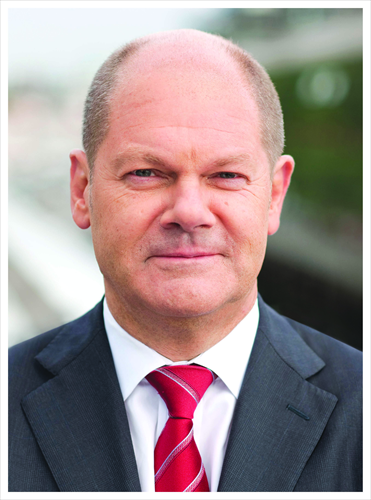Editor's Note:
Olaf Scholz (Scholz), a politician with Germany's Social Democratic Party (SDP), has been First Mayor of Hamburg since 2011. Known as "Germany's gateway to the world," the city and Länder (state) of Hamburg is the country's largest port and a commercial center of great trading and economic significance. With China's "Belt and Road" initiative gaining momentum, some observers believe Hamburg can be an important partner on the route. On August 31 at a group interview with Chinese journalists, Global Times reporter Yin Lu talked to Scholz, who exchanged his view on Hamburg's economic development, its connections with China, and the efforts it has made to deal with the refugee crisis.

Olaf Scholz Photo credit: Florian Jaenicke
Q: What role do you believe Hamburg will play in regards to China's "Belt and Road" initiative?
Scholz: We are the most important part of the "silk road" of the modern times, in regards to cargo transport via ships.
We have the most competitive harbor if you look at the figures, and we are modernizing the harbor more and more. Hamburg harbor already has the best train connections in the whole continent.
It's a good idea of the Chinese government to develop infrastructure leaving China which does not follow the traditional ways of being connected to the world. It is much more important to have better railway links to Vietnam, Russia, or Myanmar.
But for big mass transportation, ships will be always the cheapest option. Transporting a container from Shanghai to Hamburg is cheaper than transporting it from Hamburg to Hanover (a city on the River Leine, in northwestern Germany) on a truck. And this means that even in the future, 90 percent of the goods going from China to Europe will use ships. But, in the end it is a useful strategy to be connected.
Q: There is an ongoing debate over China's market economy status in Europe. What is your take on the issue?
Scholz: It's a necessary debate. I have no doubt that in the end there will be a market economy status that everyone will accept.
There's a procedure going on.
There are some questions that are raised. One of them is dumping. This could happen in different ways when public money is spent to decrease prices for exportation, which is a problem.
I think many people understand that it's necessary for market economy status that it should be clear that there is no political intervention in economic development. Yes, we are always making legislation and we have bureaucracy looking at the people. But it must be foreseeable.
Q: In face of the refugee crisis, what are the biggest challenges for you as Mayor of Hamburg?
Scholz: In the beginning, people lived in former company compounds, or furniture storehouses. Now we try to build real houses for refugees. But this is very difficult and we are always in court about the questions because usually it takes three years to make it possible to build house in places where there are no houses before. We have some federal legislation to help us but it is new and everyone is against it.
This is different from the US and other places in the world. They open themselves for refugees, but the refugees go to the poor districts. This is different in Germany because we have decided that we try to get them places in the working districts of the cities.
There have been protests and there will be protests. The people are still very in favor of supporting the refugees.
We are very successful in putting all the young children in school, and those 14- or 15-year-olds into apprenticeship education. Then we have a system to determine the older people, what is their profession, and how we could get them into work - this is our biggest task. It's very special in Germany because most sectors of unskilled labor are not in Germany anymore, and the success of German business means we lost the companies that make consumer goods and use cheap labor to China, Vietnam and other countries. We assume many among the refugees are not that skilled or with much higher education, so it's a challenging task to find a job for someone when all these kinds of work have already vanished.
Q: There is real concern about safety surrounding the refugee crisis. How does the government ensure its people's security?
Scholz: We have to invest a lot in the infrastructure, the police, the courts, to fight against criminal activities. You won't find a city in the world where a tourist never gets the hint that you should not go to this or that street. But if you go to any of the districts in Hamburg, nothing will happen to you. Even the refugees choose Germany as the place where they have a secure life. It's our task to continue with this situation, and it will be successful.
And yes, there's terrorism. Our police and the intelligence units are working very hard to get the necessary access before someone is doing things. If they are organized, if they have friends, if they are cooperating, our chances to get them before they do something are quite good.
